Review: "In the Land of Blood and Honey" is a flawed but respectable passion project from Angelina Jolie

Film Rating: C+
Angelina Jolie makes her writing and directing debut with “In the Land of Blood and Honey,” a drama depicting the Bosnian War of the early 1990s. The War was the most devastating European conflict since World War II, characterized largely by the systematic genocide of Bosniaks (Bosnian Muslims) and the widespread rape and sexual enslavement of predominantly Bosniak women, both types of war crimes mainly carried out by Serb forces. Despite the horrors of the War, it’s a conflict unfamiliar to most Americans, and I respect Jolie’s efforts immensely for the bold, unflinching style with which she approaches the conflict. On a purely visceral level, “Land of Blood and Honey” is an absolute triumph. It puts the viewer right into the heart of one of the darkest chapters in human history, and while it is extremely hard to watch at times, it succeeds in making us feel the terrifying impact of these atrocities.
As a narrative, the film is less impressive. Jolie’s directorial talents far outclass her writing skills, and she has a tough time crafting three-dimensional characters, justifying the core relationship of the film, or clearly articulating many of her thematic interests. It’s not a movie I would ultimately classify as an artistic success, but on the balance, it comes damn close, and as one of the only films to so fearlessly tackle this subject matter, I do think it’s worth seeing.
“In the Land of Blood and Honey” opens today at the Denver Film Center//Colfax; continue reading my review after the jump…
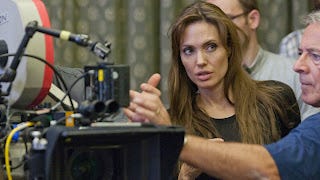
As director, Angelina Jolie makes a number of fantastic decisions that separates “In the Land of Blood and Honey” from other, lesser combat films. First and foremost, she’s gone for maximum authenticity, shooting the film in Hungary, reasonably close to Bosnia; exclusively using local actors, many of whom lived through the war; and having the performers speak in their native language (Serbo-Croatian). That last part made me particularly happy; if you don’t know this about me by now, I hate the practice of dubbing foreign films, and it bothers me even more when foreign characters who should be speaking in their native tongue are made to talk in English (it’s part of the reason I just couldn’t get behind “War Horse” – the German scenes felt phony), so shooting and releasing this film with the accurate language earns Jolie some serious brownie points from me. I have no idea how she convinced a studio to let her do this, but I’m very glad she did, because the characters, their lives, and the horrors of war feel so much more palpable with such total authenticity.
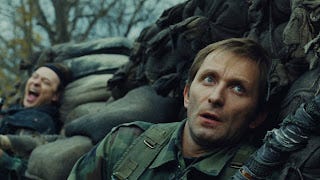
I also love the way Jolie has shot the film; it goes for the raw, documentary realism we’ve seen in dozens of other war movies, but without a shaky, handheld aesthetic. The photography is clear and coherent at all times, while still conveying a crucial immediacy. Jolie’s approach to violence, meanwhile, is harsh, unflinching, and spontaneous. Few moments of bloodshed have any buildup and rarely are they reflected upon afterwards. As in a real war, gunfire and explosions simply happen; they are inescapable, they are bloody, they are disturbing, and the monotonous, constant flow of violence soon grows numbing. But that’s exactly the point: for those who lived through this war, pain and death became facts of life, and Jolie does an amazing job putting us in their shoes.
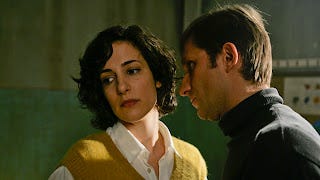
But as I said before, I have no complaints pertaining to the direction of the film; it’s the writing that needs work, as Jolie has put together a very messy screenplay. The script follows two main characters: Ajla, a Bosniak woman in her twenties, and Danijel, a Serb soldier, who before the war had a brief romantic encounter. Danijel is morally confused when the war begins, and grows more apprehensive when Ajla arrives at his compound as one of many female slaves. Danijel and Ajla enter into a romance, and their relationship is both the core thrust of the narrative and the film’s single biggest flaw.
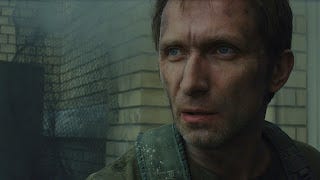
I’ll put it bluntly: the romance is disgusting. It’s disgusting that Ajla should consensually enter into a relationship with a man whose job is to wipe out and kill her people, and it’s disgusting that we should be made to sympathize with this killer. I understand what Jolie’s getting at, that Ajla and Danijel are both innocent people thrust into a horrible scenario, but Danijel’s actions don’t support that interpretation. Yes, he feels bad about what he’s doing, but does that count when he assists in rounding up Bosniaks and putting them into camps? His behavior in the film’s second half becomes particularly despicable, and Jolie’s writing isn’t clear enough to explain exactly where Danijel is coming from. One moment, he’ll be committing atrocities and feeling bad about them; the next, he’ll be screaming at Ajla trying to justify his actions, and I could never get a read on how much Danijel really believed in what he was doing.
More problematic, though, is how Ajla reacts to all this. She continually sacrifices her freedom and safety to be with him, which would be an iffy narrative move even if Jolie gave us some indication as to what Ajla sees in this man. I hate to make the comparison, but the Ajla/Danijel romance feels like the real-world equivalent of the Bella/Edward relationship in the “Twilight” series, where a young woman continually returns to an abusive and dangerous man for no clear reason.
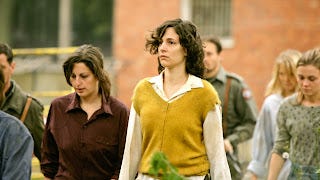
To be frank, it’s sexist, and it’s more of a problem here than it is in “Twilight.” Those books are obviously misogynistic across the board, and thus easily dismissed, but in “Land of Blood and Honey,” Jolie is clearly trying to take a feminist approach, examining the toll this conflict had on women. When we move away from Ajla, that theme hits hard, but Ajla herself seems to be saying that women should be subservient to men, even if being subservient puts one’s life at risk. I don’t believe that’s the message Jolie means to send, but whatever she’s actually trying to say with this relationship, it isn’t backed up by the writing. It doesn’t help that she fails to give Ajla even a hint of a personality. As written, she’s a total blank, with no distinguishing characteristics or discernably unique motives. Zana Marjonovic is decent in the role, but she does nothing to make the character any less bland.
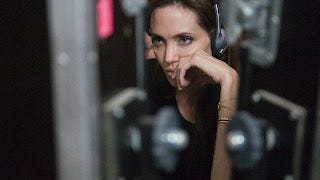
So much of “In the Land of Blood and Honey” works so well, but a useless protagonist and a wildly wrong-headed central romance are two flaws the film as a whole simply can’t rise above. When the film focuses on the war itself, the atrocities and the tragedies, it works spectacularly, and forces the viewer to reexamine their thoughts on international affairs and isolationist politics. Too little of the film is up to that standard to ultimately give it a ‘good’ review, but I can still give the film a measured recommendation, and if Jolie wants to keep directing, perhaps with some help on the writing side of things, I would be very enthusiastic to see what she does next.

